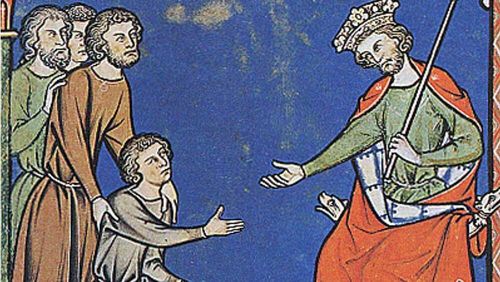In many churches, it is sometimes rumored that the Old Testament (that is the First Testament for any Messianic readers ;-) is irrelevant to being a follower of Jesus. This is a misguided assertion that I find to be an excellent entry point for revealing the beauty of Scripture. Case in point, this Sunday’s chapter in 2 Samuel. Specifically, chapter nine. It’s about King David and a man by the name of Mephibosheth. This Story is one of the most touching and encouraging moments in that it tells us much about the love of God.
Mephibosheth was the son of Jonathan, and the grandson of King Saul. When Saul was trying to kill David, and David had to run for his life, Jonathan knew God had chosen David for greatness. In 1 Samuel 20, Jonathan entreats David to show steadfast love to his “house” (descendants) and David swears an oath of faithfulness to this request. (Incidentally, it’s quite astounding that David agrees to this request, for in those days, when a King came to the throne, he disposed of his predecessor’s family to ensure that his own reign would be unobstructed by vengeful sons of the deposed, deceased former King!)
And now, here in 1 Samuel 9, David is now King over all Israel. He is living in his palace. His enemies are at bay. The biggest players in the old Saulide regime are now dead, and there is peace on all sides of the Land. In 9:1, King David remembers an oath he made to Jonathan, the son of King Saul: “Is there still anyone left of the house of Saul, that I may show him [loving]kindness for Jonathan's sake?”
It turns out that there is someone left in Jonathan’s family to bestow kindness. He was introduced in 2 Samuel 4:4— “Jonathan, the son of Saul, had a son who was crippled in his feet. He was five years old when the news about Saul and Jonathan came from Jezreel, and his nurse took him up and fled, and as she fled in her haste, he fell and became lame. And his name was Mephibosheth.”
Mephibosheth was living on the other side of the Jordan River, in a desert area, seemingly as far away from Jerusalem as he could get! Apparently, lying low, trying not to be noticed. It is revealing that his name means “shame.” And it says that the wilderness area he was dwelling in was named Lo-Debar, which translated literally, means “no word.” Not a stretch to say that it might be more accurate to call the place “nothing.’ Mephibosheth is the man of “shame” from “nowhere!”
When Mephibosheth comes before King David, he must be terrified. He probably thought he was a dead dog. In fact, that’s what he calls himself before the King. “What is your servant, that you should show regard for a dead dog such as I?” (2 Sam. 9:8). This is where we find an unexpected announcement of grace. The King, using language that scholars refer to as “salvation oracle language,” declares, “Do not fear, for I will show you kindness for the sake of your father Jonathan, and I will restore to you all the land of Saul your father, and you shall eat at my table always.” (2 Sam. 9:7).
Mephibosheth is a picture of a man in weighed down in unworthiness. He has nothing to commend himself to the King, and the King has absolutely no incentive to take notice of poor fellow. But he does. Theologian Peter Leithart, in his readable commentary on First and Second Samuel by the title, “A Son to Me,” writes of this encounter: This is “a picture of the grace of Jesus, the greater David. Though we are [fallen sinners], He feeds us at His table as king’s sons, though we are enemies, He shows to us the [steadfast love] of God.” (p.229).
One has to think here of Paul’s magisterial presentation of God’s steadfast love to Mephibosheth-like sinners in Ephesians 2:1-6. “And you were dead in the trespasses and sins in which you once walked, following the course of this world, following the prince of the power of the air, the spirit that is now at work in the sons of disobedience— among whom we all once lived in the passions of our flesh, carrying out the desires of the body and the mind, and were by nature children of wrath, like the rest of mankind. But God, being rich in mercy, because of the great love with which he loved us, even when we were dead in our trespasses, made us alive together with Christ-- by grace you have been saved— and raised us up with him and seated us with him in the heavenly places in Christ Jesus.”
Chapter 9 closes out with these beautiful words: “So Mephibosheth ate at David's table, like one of the king's sons… So Mephibosheth lived in Jerusalem, for he ate always at the king's table. (2 Sam. 9:11, 13).
Who says the Old Testament isn’t relevant to the Gospel? It surely is!


